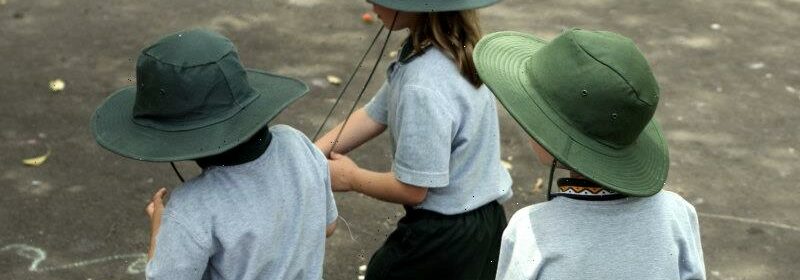A back-to-school guide for mastering the morning chaos

The school year is about to start and for many parents that means a return to the stress of getting kids out the door and off to school every day.
Sara Cruise, who lives in Sydney’s northern beaches, has to get her daughter Ruby, 9, to school and son Jake, 3, to preschool before work.
Remove the stress from the school drop-off.Credit:Janie Barrett
“My daughter has hair down her back and always has to have a ballet bun. Then juggling Jake, a fierce little three-year-old person who is just always running amok and getting dressed, he takes his shoes off and then has to put his shoes back on. Getting them into the car to get to school on time is always a mission,” she says.
Ahead of the return of school drop-offs, three Australian experts share their tips on making mornings more manageable.
Map out the journey
Bonnie Black is a professional organiser and co-host of the Little Home Organised podcast.
She says it is essential to visualise and map out a journey in one direction. A typical journey could be from the bedroom: get dressed, make the bed, then to the kitchen for breakfast then into the bathroom: brush teeth, brush hair, and then finally to the car.
“When we send kids back for socks or homework, that’s when kids get distracted,” she says.
Black believes it’s all about ensuring playtime is kept to a minimum until the morning routine is complete.
“Keeping toys and games in a playroom, behind a locked door, such as with a Door Monkey device, also works well.”
She suggests using technology to avoid repeating the same instructions multiple times.
“We don’t need to be that broken record, especially when you’ve got multiple children. Because that gets pretty tiring as a parent.”
Her family use Google routines to keep them on track.
“A routine will go off on Google and remind them where they need to be up to. It might say, you should have finished breakfast, or you should be getting dressed.”
Create a ‘go-zone’
Black recommends having a “go-zone” at an entrance point like a garage. A go-zone saves everyone time looking for things and reduces the clutter in the house.
“It’s where the bags get stored; there’s a shoe box for the kids to chuck their shoes in. Hats and library bags stay in their bag,” she says.
“School bags float around. Sometimes they’re in a wardrobe. Sometimes they’re at the end of the bed. Sometimes they’re dumped in the kitchen. So this gives everything a home.”
Make time for yourself
Lauren Keegan is a registered psychologist specialising in supporting parent-child relationships. She says waking up before the kids allows time for self-care.
“Taking a moment to yourself to centre yourself for the day ahead can be helpful. When children feel hurried, they’re less likely to cooperate. When parents are feeling stressed and rushed then children tend to pick up on that and they tend to unravel, too,” she says.
Self-care is critical as children require a lot emotionally from their parents.
“Filling up your own cup means you can be more connected to your children, which will get their day off to a good start too.”
With life as busy as it is, the idea is to find something that calms you and makes you feel present and centred.
“Even taking five minutes to yourself can help parents feel calmer and in control. Having a cup of tea, reading a book, taking a warm shower or exercising are good self-regulatory activities.”
Keegan suggests finding a way to do something with your child before asking them to do something. Listen to their reading, music practice or a quick walk together before getting ready for school.
“A child who feels connected with their parent is more likely to be cooperative. A connection can be making eye contact, physical touch or talking to your child.”
Up the verbal encouragement
Maggie Dent is a parenting author and educator and host of ABC’s Parental As Anything podcast.
Dent says the best way to support our children is to prepare the night before.
Maggie Dent says encouraging children is the best way to build long-term good habits.Credit:Mad Love Nation
“I recommend in primary, especially for little ones starting big school and boys, to have a basket or box where everything they need to get dressed is placed, so it’s easy to find and get ready.”
For longer-term success, Dent prefers verbally encouraging children rather than incentivising them with sticker charts and rewards.
For example, “I notice how you got dressed without me asking you. Well done.” Or “you are ready 10 minutes before we have to go out the door, that is amazing.”
Accepting that no matter how hard anyone tries, there will be days where chaos prevails is vital, according to Dent.
“Tomorrow is a new day. No one is failing, and remember the power of laughter and lightness… Everyone is doing the best they can every morning – no really, they are.”
Make the most of your health, relationships, fitness and nutrition with our Live Well newsletter. Get it in your inbox every Monday.
Most Viewed in Lifestyle
From our partners
Source: Read Full Article

